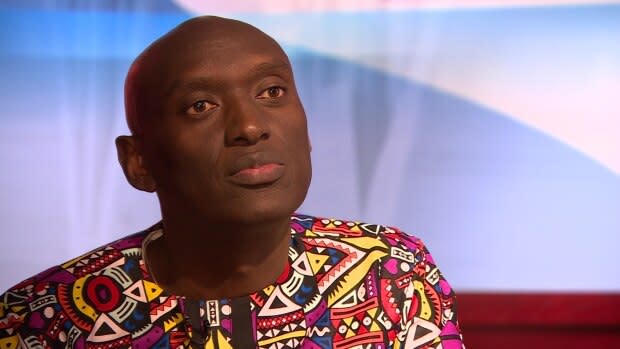Calls for culturally-specific care amidst concerns over mental health issues in black communities
Eight years after Fiyin Obayan suffered from a severe mental breakdown, she still remembers how terrifying it was.
"It was like I was a different person. I just kind of lost sight of reality. It's like I kind of go in and out of it," said the 28-year-old.
Away from home, Obayan was registered in a demanding program at the Canadian College of Performing Arts in British Columbia. She said her mental breakdown and hallucinations ensued from a lack of sleep, rest and self-care.
Obayan is now leading an awareness crusade. At the helm of the Association of Black and Caribbean Canadians in Saskatchewan, she organizes mental health awareness events in black communities in Saskatoon.
She and others are also sounding the alarm about the state of mental health in black communities across the country and how little is known about it, and are urging action especially in the form of culturally-appropriate services.
Culturally-appropriate services pivotal: experts
In December, Dr. Mansfield Mela, professor of psychiatry at the University of Saskatchewan, offered an information session on mental health to young black professionals in Saskatoon.
He said there is a lack of culturally-appropriate services for the black communities in the Saskatchewan healthcare system.
"The existing system has not been designed in a way to accommodate the unique challenges the black communities face. When they try to intersect with those systems, problems such as the lack of understanding of their culture, the difficulties in communication with the providers in such systems on awareness or how to navigate the system, emerge," Mela said.
As a result, Mela said treatment for mental health disorders are less effective and black patients can fall through the cracks.
Growing up I can't actually think of a single time in cultural circles and cultural parties where this [mental health] actually came up in conversation. - Fiyin Obayan
The Saskatchewan Health Authority doesn't specify if it has mental health services that are culturally adapted for black people in the province. However, in a statement to CBC News, the SHA said it provides a "range of inpatient and outpatient clinical services throughout the province, and services are responsive to the diverse needs of the specific patients who are accessing them."
In 2019-20, the Saskatchewan Ministry of Health budgeted approximately $333 million in mental health services.
Fulgence Ndagijimana, executive director with the Community of Francophone Africans of Saskatchewan agrees that African immigrants face particular challenges and have specific needs.
"This is something that is worrying and that is real. I believe that mental health is really linked to the experience of many of our members, which is the experience of immigration," he said.

Several factors can contribute to a mental crisis among African immigration.
"People have been separated from their families," said Ndagijimana. "People find themselves isolated here, people have to rebuild a certain cultural identity by finding themselves in a very different cultural framework. All of these things, you just have to add the problems to get a job, to have the basics like affordable housing [for a mental health crisis]."
He, too, is calling for culturally-specific services, noting the compounding factor of taboos in some cultures.
"Africans who live here might not talk about it openly, so they won't tell anyone. Sometimes even if you are a nurse or you are a doctor they may not tell you. So, we need to bring appropriate responses and culturally specific," he said.
A few years ago, a Burundian died by suicide in Saskatoon, sending a wave of shock through the African community.
Data is power. So once we have a baseline dataset about the prevalence of mental healthcare issues or access to care issues in black communities, then we can advocate for further policy for funding and for resources. - Dr. Fatimah Jackson-Best
But Obayan said there is a reticence to talk about mental health in black communities that needs to be tackled.
"Growing up I can't actually think of a single time in cultural circles and cultural parties where this [mental health] actually came up in conversation. I've actually heard more narratives of 'Africans, we don't have depression' or I've even heard a comedian at Nigerian weddings say, 'We don't have depression — that's a Western thing."
Obayan shares her story to help others around her.
Community-based action
Obayan isn't the only one mobilizing. Fatuma Omari is a project assistant at the French Health Network in Saskatchewan. Last January, she took a mental health first aid course.
The Saskatoon-based woman decided to learn how to help others in the midst of a mental health crisis after a close friend experienced a major panic attack.

"I didn't know what to do or what to say or how to handle this situation. It was very scary because it was unexpected. It sort of just happened on the spot and I had a lot of thoughts going through my mind. Was he going to be OK? Am I going to be OK? What if he gets violent? It was a scary, scary moment for me," the 27-year-old said.
Originally from Congo, Omari has been living in Saskatchewan since 2007. She believes it is time to have more conversations about mental health in black communities here.
Omari has sparked discussions with family members and tries to help teenage nieces, nephews and cousins.
"I started asking simple questions: Do you have problems at school? Are you being bullied? Just to know if we need to talk a little more. I am the only one in the family. They are a little more comfortable talking to me about it," Omari said.
Barriers to care
Dr. Fatimah Jackson-Best, professor at the York University and project manager of Pathways to Care at the Black Health Alliance in Toronto, said there are many existing barriers to accessing mental health services, namely long waiting time, institutional racism and lack of institutional support.
"We have to recognize that something called anti-black racism exists. And so anti-black racism is a specific kind of racism that black people experience by virtue of the fact of being black or the experience of being black," Jackson-Best said.
Calls for a national research and policy
Aside from community-based efforts, experts are calling for Canada-wide research on mental health in black communities in order to have a clear portrait of their needs.
"The data is very minimal. There hasn't been a nationwide attempt to establish what the needs are, but also to inquire from black communities," Mela said. "There hasn't been a systematic review to establish formally what is exactly the rates in Canada."
Jackson-Best reinforced that there is a lack of information about the prevalence of mental disorders in black communities across the country as well as mental care and access to resources and services.
"Data is power. So once we have a baseline dataset about the prevalence of mental healthcare issues or access to care issues in black communities, then we can advocate for further policy for funding and for resources," she said.

Last year the federal government committed $19 million to promoting positive mental health in black communities.
Jackson-Best said that's not enough.
"That's a good start, but that's not where we have to finish, right? We have to see regular influxes of resources into black communities across the country to ensure that we're making headway."
She added that mental health policies need to be specific to provincial realities.
Both Jackson-Best and Mela are calling for a national conversation on mental health led by black communities and people who work with them to see, as Jackson-Best said, "what and how we can intervene and put in very positive ways."
Eight years after her mental breakdown, Obayan says there's hope.
"Mental illness is just like anything else. If you hurt yourself you would do what it takes to do the physio for that. Take care of your mind."
If you need help:
Mental health resources are available across Canada through the HealthLine at 811.
The federal government has a toll-free number for First Nations and Inuit people who are experiencing mental health issues: 1-855-242-3310.
If you're worried someone you know may be at risk of suicide, you should talk to them, says the Canadian Association for Suicide Prevention.
Here are some of the warning signs:
Suicidal thoughts.
Substance abuse.
Purposelessness.
Anxiety.
Feeling trapped.
Hopelessness and helplessness.
Withdrawal.
Anger.
Recklessness.
Mood changes.


